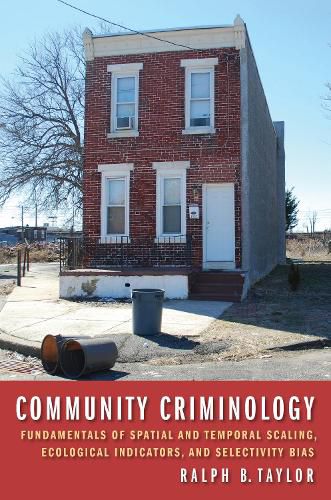Readings Newsletter
Become a Readings Member to make your shopping experience even easier.
Sign in or sign up for free!
You’re not far away from qualifying for FREE standard shipping within Australia
You’ve qualified for FREE standard shipping within Australia
The cart is loading…






For close to a century, the field of community criminology has examined the causes and consequences of community crime and delinquency rates. Nevertheless, there is still a lot we do not know about the dynamics behind these connections. In this book, Ralph Taylor argues that obstacles to deepening our understanding of community/crime links arise in part because most scholars have overlooked four fundamental concerns: how conceptual frames depend on the geographic units and/or temporal units used; how to establish the meaning of theoretically central ecological empirical indicators; and how to think about the causes and consequences of non-random selection dynamics.
The volume organizes these four conceptual challenges using a common meta-analytic framework. The framework pinpoints critical features of and gaps in current theories about communities and crime, connects these concerns to current debates in both criminology and the philosophy of social science, and sketches the types of theory testing needed in the future if we are to grow our understanding of the causes and consequences of community crime rates. Taylor explains that a common meta-theoretical frame provides a grammar for thinking critically about current theories and simultaneously allows presenting these four topics and their connections in a unified manner. The volume provides an orientation to current and past scholarship in this area by describing three distinct but related community crime sequences involving delinquents, adult offenders, and victims. These sequences highlight community justice dynamics thereby raising questions about frequently used crime indicators in this area of research. A groundbreaking work melding past scholarly practices in criminology with the field’s current needs, Community Criminology is an essential work for criminologists.
$9.00 standard shipping within Australia
FREE standard shipping within Australia for orders over $100.00
Express & International shipping calculated at checkout
For close to a century, the field of community criminology has examined the causes and consequences of community crime and delinquency rates. Nevertheless, there is still a lot we do not know about the dynamics behind these connections. In this book, Ralph Taylor argues that obstacles to deepening our understanding of community/crime links arise in part because most scholars have overlooked four fundamental concerns: how conceptual frames depend on the geographic units and/or temporal units used; how to establish the meaning of theoretically central ecological empirical indicators; and how to think about the causes and consequences of non-random selection dynamics.
The volume organizes these four conceptual challenges using a common meta-analytic framework. The framework pinpoints critical features of and gaps in current theories about communities and crime, connects these concerns to current debates in both criminology and the philosophy of social science, and sketches the types of theory testing needed in the future if we are to grow our understanding of the causes and consequences of community crime rates. Taylor explains that a common meta-theoretical frame provides a grammar for thinking critically about current theories and simultaneously allows presenting these four topics and their connections in a unified manner. The volume provides an orientation to current and past scholarship in this area by describing three distinct but related community crime sequences involving delinquents, adult offenders, and victims. These sequences highlight community justice dynamics thereby raising questions about frequently used crime indicators in this area of research. A groundbreaking work melding past scholarly practices in criminology with the field’s current needs, Community Criminology is an essential work for criminologists.